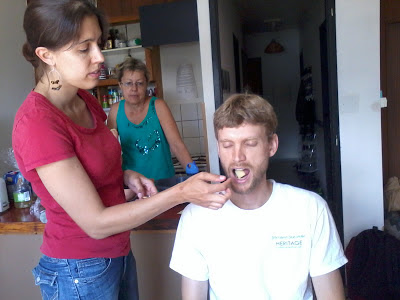Taste-Test: Fromage
As we have alluded to before, French food has an intrinsic attachment to its land. That is why, for the most part, French wines are named not for their grapes (such as Merlot, Pinot, Chardonnay), but for their region of land (Bordeaux, Bourgogne, Cotes du Rhone). It's the same thing for cheeses, and a few other products.
There are of a lot of French cheeses that have earned the right of their proprietary name being protected by the government. We have a couple local examples of this. Our favorite is the Beaufort, which is about 15km from Albertville. If you're going to call it Beaufort, your cows have to graze on this certain side of the mountain. If not, the cheese police will come after you (I guess).
But cows do graze the other side of the mountain. And cheese is made from them by basically the same process. What to do with such disgraceful bovine products? Hmm...we can't call it Beaufort...how about Beaumont?
And voila, we have Beaumont cheese, which sells for about 70% of the price of Beaufort. French food tradition would suggest that it cannot be the same taste, since the taste is linked to the land, and the land is (though albeit nearby) not the same. I must admit that, growing up happy on American generic products as I have, I was skeptical of any significant difference.
Rachel's family is visiting, and they bought some Beaufort. We then realized that we had some leftover Beaumont in the fridge. Taste test! The Beaumont is at the top of the picture, and the Beaufort is on the cutting board at the bottom. As well trained medical scientists, we created a blinded study by cutting the cheeses into the same shape. I closed my eyes and Dr. Rachel fed me the first one.
However, immediately on tasting, I could sense a difference. I had a suspicion that this wasn't the real Beaufort. I rinsed a bit to cleanse the palate, and then Rachel gave me the second.
This time there was no doubt. The second piece was much creamier with a much stronger Beauforty taste. I told Rachel my results. I was right. She did the same, as did Aunt Lois, in a non-blinded fashion, and the result was unanimous.
Sorry, cows on the other side of the mountain. The cheese is good, but it's not Beaufort.










4 comments:
c'est vraiment incroyable que vous avez pensé que Beaufort et Beaumont seraient assez similaire à confondre une langue - même si la langue n'était pas encore habituée à distinguer entre tous les types de fromage.
quand j'ai eu le Beaumont toute seul, ce n'etait pas évident, mais les deux en suite...c'est tres plus claire.
Matthew and I are wondering if the fact that one had been sitting in the fridge for a while had any impact on the study :)
-Stephanie Z
Yes, well, it wasn't a very SCIENTIFIC study... :)
Post a Comment